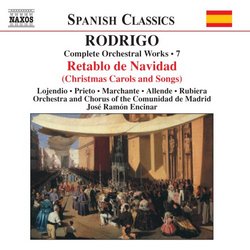| All Artists: David Rubiera, Joaquin Rodrigo, José Ramón Encinar, Comunidad de Madrid Orchestra, Raquel Lojendio, María Jesús Prieto, Ada Allende, Victoria Marchante Title: Rodrigo: Complete Orchestral Works, Vol. 7 Members Wishing: 0 Total Copies: 0 Label: Naxos Original Release Date: 1/1/2003 Re-Release Date: 10/21/2003 Genre: Classical Styles: Opera & Classical Vocal, Sacred & Religious, Symphonies Number of Discs: 1 SwapaCD Credits: 1 UPC: 747313222322 |
Search - David Rubiera, Joaquin Rodrigo, José Ramón Encinar :: Rodrigo: Complete Orchestral Works, Vol. 7
 | David Rubiera, Joaquin Rodrigo, José Ramón Encinar Rodrigo: Complete Orchestral Works, Vol. 7 Genre: Classical
|
Larger Image |
CD Details |
CD ReviewsAusterely Moving Spanish Music--Not Your Usual Rodrigo J Scott Morrison | Middlebury VT, USA | 10/28/2003 (5 out of 5 stars) "For some reason although I am attracted mightily to Spanish orchestral and piano music--I've recently written rave reviews of new recordings of Granádos piano music and of delightful Guridi vocal and orchestral music--I am not all that fond of guitars. And since Rodrigo's reputation was built solidly upon his guitar concerti (e.g. the ubiquitous 'Concierto de Aranjuez' and 'Concierto para un gentilhombre') and because I've found that music to be facile but not emotionally involving being being 'pretty,' I had not particularly investigated his music beyond those concerti. My loss, it turns out.This is Volume 7 of Naxos's ongoing series presenting Rodrigo's complete orchestral music. It contains vocal/orchestral music on religious texts and it is striking from beginning to end.'Retablo de Navidad' (1952) is a collection of Christmas songs set for soprano and bass soloists, chorus and orchestra. Highly varied, they are consistently engaging and show us a Rodrigo whose skills include fascinating use of varied meters, polytonality, quasi-medieval harmonies as well as Spanish-inflected French-derived impressionistic sound. Particularly moving are the solo soprano's 'La Espera,' whose text expresses hope that the Christ-Child will come, and a lullaby sung by Joseph and Mary, 'Duérmete, Niño,' to words by Rodrigo's wife, Victoria Kamhi. There is also a light-hearted a capella choral song, 'A la Chiribirivuela,' with a tongue-twisting onomatopoetic text. 'Himnos de los neófitos de Qumrán' (1965-74) is a setting of three texts from the Dead Sea scrolls, written in a style that I simply would not have expected from Rodrigo. It is polytonal, uses a tone-row, and has harmonies based consistently on minor seconds, yet it is entirely accessible, its sparse textures conveying the sincerity of these almost whispered hymns of praise for the Almighty. The three archangels--soprano soloists María Jesús Prieto, Victoria Marchante, and Ada Allende--are simply stunning in the purity of their tone and the accuracy of their tuning; the male chorus is hardly less impressive. This twenty-minute set of 'hymns' is destined, surely, to become a repertoire piece [and indeed, I've put in a call to the music director of our local professional chamber choir to put him onto this music].'Musica para un códice salmantino' ('Music for a Salamancan Codex,' 1953), is an eleven-minute setting for bass soloist, mixed chorus and orchestra written for the septicentenary of the University of Salamanca, which was an important repository of learning during the Dark Ages and an intellectual center of the Renaissance. It is set to 'Oda a Salamanca,' by the university's former rector, the distinguished proto-existentialist philosopher/poet Miguel de Unamuno (1864-1936). The text sings the praises of the city and its university ('Oh, Salamanca! Amongst your golden stones the students learnt of love, as the fields which embrace you gave forth their ripe fruits'). The music here creates a feeling of the glory of the Spanish Renaissance with modal harmonies and occasional brass fanfares.'Cántico de San Francisco de Asis' ('Canticle of Saint Francis of Assisi,' 1982) for chorus and orchestra was written to celebrate the 800th anniversary of the birth of St. Francis. This 19-minute piece is one of Rodrigo's last works. Set to a poem of praise by the saint ('All-highest, omnipotent good Lord, to you be all praise, glory') translated into Spanish, it lists the things for which we should praise God--Mother Earth, Brother Fire, Sister Moon, Brother Sun, Brother Wind and, finally, Sister Death. The string-dominated orchestral music is solemn, medieval in tone with occasional brass and wind interjections and with portentous timpani toward the end. The tone is mystical, austere, ultimately jubilant. The Chorus and Orchestra of the City of Madrid under the direction of José Ramón Encinar are effective, here as in the earlier pieces. I have to say that I was moved and delighted by this CD, partly because it came as such a suprise to me. I had no idea that Rodrigo was capable of such deeply moving music. And that's one reason I keep listening to new music, music I might not otherwise have heard--for moments like these.Strongly recommended.TT=71:48Scott Morrison"
|

 Track Listings (13) - Disc #1
Track Listings (13) - Disc #1